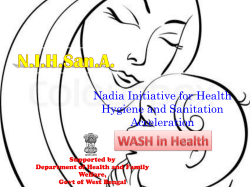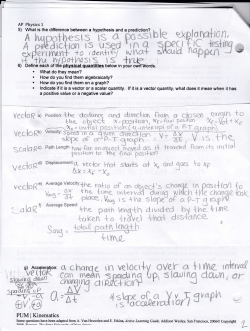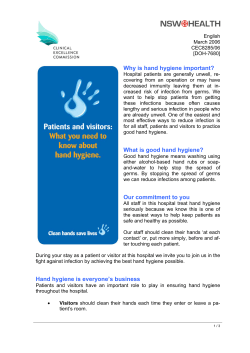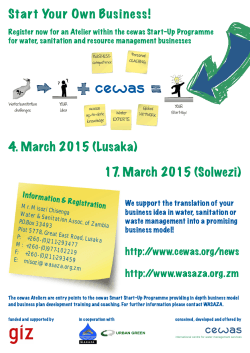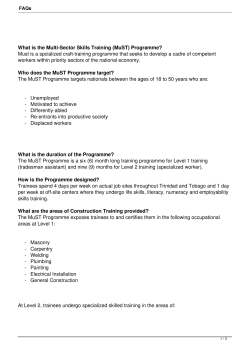
Hygiene Promotion Training using PHAST, CLTS and CHAST
www.idealphdc.org Hygiene Promotion Training of Trainers using PHAST, CLTS and CHAST: Factsheet About the Course Course Objectives Hygiene promotion plays a key role in changing collective and individual behaviours together with fostering ownership and sustainable use of water and sanitation facilities. It is upon this premise that IDEAL Public Health and Development Consultancy (IPHDC) has planned to conduct a PHAST, CLTS and CHAST training of trainers. This training is intended to help sector practitioners to accelerate their progress towards achieving their overall and specific project objectives, national targets and contribute towards the realization of global targets such as MDG 7 target 7C (Halve by 2015 the proportion of people without sustainable access to safe drinking water and basic sanitation). To build the capacity of trainees to impart knowledge to their community on prevention of diarrhoeal diseases and other water and hygiene related diseases. To equip trainees with practical facilitation skills of PHAST, CHAST and CLTS approaches. To enable trainees formulate appropriate health promotion messages using the BCC strategy. To provide the trainees with the monitoring and evaluation formats for the three hygiene promotion approaches. By the end of the training, trainees will be able to understand which approach may be most appropriate for their unique contexts. Target Audience Programme staff of humanitarian and development agencies including project managers, officers, assistants, health workers, hygiene promoters, public health officers and facilitators. Course Content Concepts of community participation, ownership and sustainability. Concepts of hygiene and sanitation in relation to health. The process of hygiene and sanitation behaviour change and the key factors that influence it. Practical facilitation skills of PHAST, CHAST and CLTS methodologies through in house simulation activities and field activities. Language of Instruction English Giving excellent services to our clients Hygiene Promotion Training of Trainers using PHAST, CLTS and CHAST: Factsheet Training Methodology Accommodation The training will use exploratory learning, small group discussions, plenary brainstorming, facilitator’s input, case studies and video documentaries. Accommodation will be arranged upon request. However, the charges will be borne by the individual participant. Application process Training Cost The training cost is US$ 800 and it covers the tuition fees, learning materials, meals and refreshments at the training venue. Further information will be provided upon inquiry. Applicants should complete our online application form and submit it for their admission to be processed. Our previous trainee RISPER WERE NYAKOA (WASH Program Officer) Norwegian Church Aid (NCA), Somalia Program Training Dates We have planned to conduct this training course four times this year in Nairobi, Kenya. The effective dates are as follows: 5th to 16th January 2015 7th to 17th April 2015 1st to 11th September 2015 2nd to 13th November 2015 Tailor-made training option We can provide your organization a tailor-made training with similar content but addressing your specific needs. In case you want to explore this option, you can contact us to share with you a proposal for that training. Contact Information P.O. Box 102907 00101-Nairobi Tel: +254 (20) 2345572 Email: admin@idealphdc.org Website: www.idealphdc.org “The training has been very informative and interactive. I have understood the application of PHAST, CLTS and CHAST approaches. I will promote the use of CLTS in our program area to end the recurrent cases of Acute Watery Diarrhoea (AWD) outbreaks. I recommend other people to attend this training in future if their aim is to end hygiene and sanitation problems in their areas of operation.” IPHDC is a training and development consultancy firm that seeks to empower development actors to deliver desired results in their work. We are committed to the empowerment of individuals and organizations through the provision of highly professional consultancy services together with standard and tailor-made trainings. Our services are provided by a team of experienced professionals including researchers, development experts, management and institutional development experts and a core group of IPHDC staff who provide technical and administrative support. The consultants have a wealth of experience in their respective areas of work and have obtained their education from internationally reputed institutions.
© Copyright 2025


